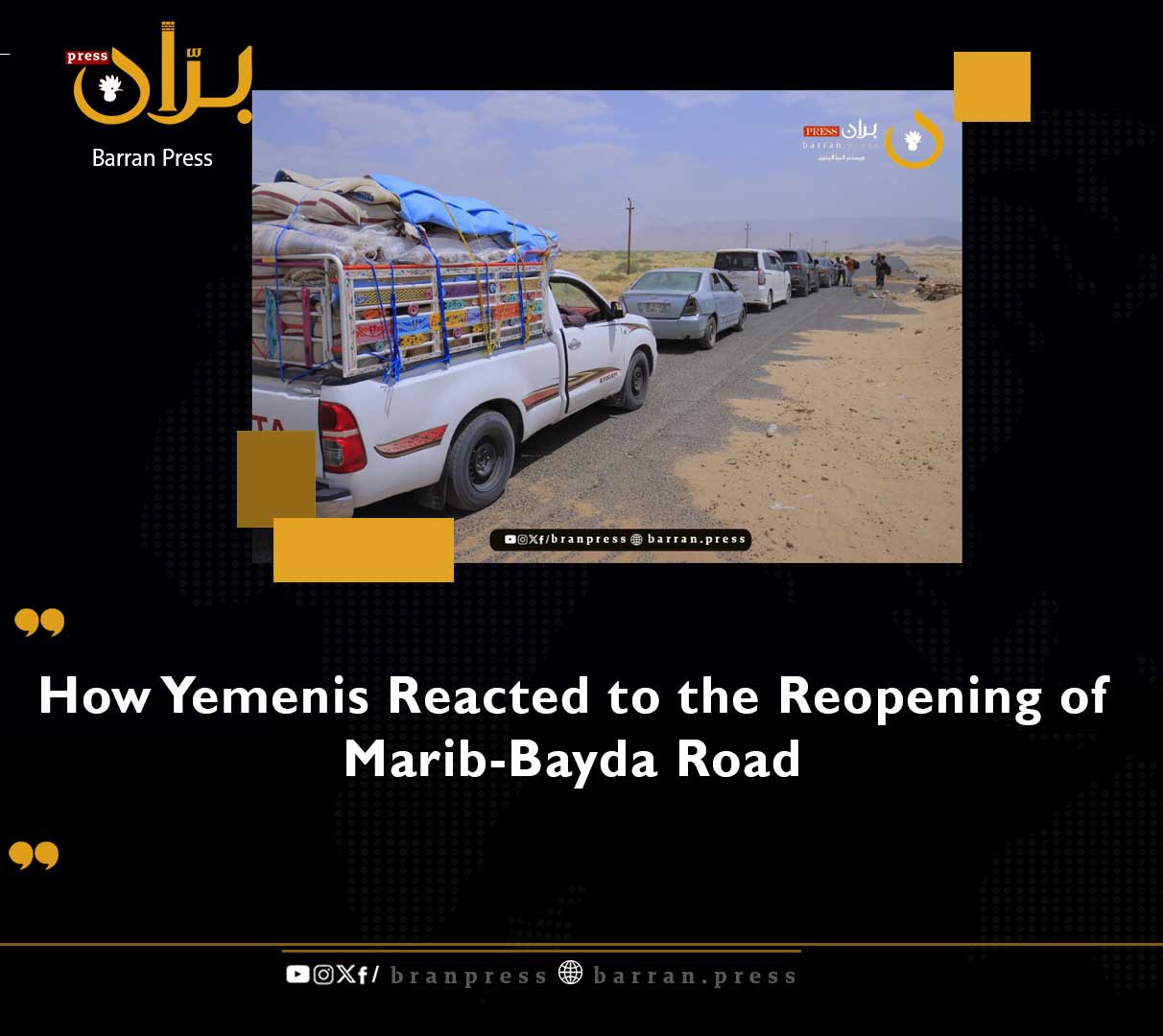


Barran Press
The road connecting Marib, Bayda, and Sana'a has been reopened to travelers after nearly three years of closure due to clashes between Yemeni government forces and Houthi rebels, who are internationally designated as a terrorist group. The reopening comes after the Marib Governor, Lieutenant General Sultan al-Arada, a member of the Presidential Leadership Council, announced the road's opening on Sunday, June 9th, 2024, at noon.
Al-Arada emphasized the importance of community involvement in supporting humanitarian efforts and facilitating the opening of closed roads between Yemeni cities. This would alleviate the suffering and risks faced by travelers forced to use alternative, arduous routes. He also referred to a previous initiative launched on February 22nd, 2024, to open the Marib-Farda Nahm-Sana'a road, highlighting the government's commitment to opening all routes connecting Marib to other provinces.
The reopening of the Marib-Bayda road has been met with widespread enthusiasm among Yemenis, as evidenced by the numerous images and videos shared on social media depicting the flow of traffic on the newly reopened route. This positive response underscores the public's appreciation for the government's efforts to end their suffering, despite the Houthi rebels' continued obstructionism and responsibility for road closures across the country.
Minister of Awqaf and Guidance in the internationally recognized Yemeni government, Sheikh Mohammed bin Ayda Shabiba, expressed his gratitude for the government's efforts to alleviate the burden on the Yemeni people and praised the opening of the Marib-Bayda road after the Houthis refused to open the Fardha road. He also commended the efforts of the Presidential Leadership Council, the Marib Governor, and the "White Flags Initiative" for their roles in facilitating the road's reopening.
The reopening of the Marib-Bayda road is a significant development for Yemen, offering hope for improved connectivity and a reduction in the suffering of the Yemeni people. It remains to be seen whether this positive step will lead to further progress in peace negotiations and a lasting end to the conflict.
لم تألُ الحكومة والسلطات المحلية في مأرب وتعز جهدًا في العمل على رفع المشقة عن شعبنا اليمني والتخفيف من معاناته واتخاذ التدابير المطلوبة في هذا السياق، آخرها فتح طريق "مأرب البيضاء" بعد تعنت المليشيات الحوثية ورفضها فتح طريق "الفرضة".
— د.محمد بن عيضة شبيبة (@alshabebah) June 9, 2024
كل الشكر والتقدير للجهود التي يبذلها رجال… pic.twitter.com/G0437srPrg
Deputy Minister of Information, Abdul Basit al-Qaidi, asserted that the Houthis' decision to open roads proves their responsibility for previous road closures and the suffering of civilians. He highlighted the government's consistent stance that roads have always been open from their side. Al-Qaidi attributed the Houthis' action to the pressure exerted by the recent initiative of Marib Governor, Sultan al-Arada, to reopen the road connecting Marib to Sana'a via Nahm, which resonated with public needs and concerns.
He further argued that the Houthis, after months of resistance, ultimately succumbed to public pressure, opening the Marib-Bayda road in an attempt to score a point against the government and undermine al-Arada's initiative. However, their gamble failed, according to al-Qaidi.
Al-Qaidi believes the Houthis only act under immense pressure, questioning the timing of the road openings coinciding with a crackdown on aid organizations operating in Houthi-controlled areas. He suggests the Houthis may be trying to ease economic pressure by facilitating the movement of goods and currency after the Central Bank of Yemen's actions significantly impacted their finances.
اقدام مليشيا الحوثي على فتح الطرق يثبت عمليا أنها وحدها من كانت تغلق الطرق وتحاصر المواطنين، وان تأكيد الشرعية الدائم ان الطرق مفتوحة من جهتها هي حقيقة ثابتة.
— عبدالباسط القاعدي (@abasetq) June 9, 2024
قيام الشيخ سلطان العرادة عضو مجلس القيادة الرئاسي بتدشين تجهيز الطريق الرابط بين مارب وصنعاء عبر منطقة نهم لامس اهتمام…
Writer and researcher Mustafa Naji drew a parallel between the reopening of a road in Taiz and the Marib-Bayda road, noting the surprise and optimism surrounding the development. He criticized the Taiz authorities' initial response as disorganized and lacking a cohesive strategy, highlighting the need for a more coordinated approach to peace and war issues.
Naji emphasized the Houthis' ongoing war against the Yemeni people and their efforts to dismantle state institutions. He warned that allowing the Houthis to exploit these openings for political gain could undermine the government's position and lead to accusations of weakness. While acknowledging the positive impact of road openings in alleviating suffering, Naji stressed the need for a structured framework, safety measures, and security guarantees to ensure lasting peace. He cautioned against overlooking the Houthis' actions and their history of violence, urging caution and a realistic assessment of the situation.
تحت تأثير المفاجأة وضغط المتفائلين "والكرة الان في ملعب الشرعية في تعز" والشاكرين لانصار الله الناسين لما يفعله وفعله في طريق البيضاء مأرب، في اول اربعة وعشرين ساعة تصريحات وردود افعال السلطة المحلية في تعز ومختلف الهيئات المعنية تجاه ما يقال انه مبادرة فتح طريق من طرف الحوثي،…
— mustafa naji مصطفى ناجي (@mustafaAljabzi1) June 9, 2024
Journalist Adnan al-Jabrani argued that the Houthis were forced to open roads due to pressure from the government's initiatives in Marib and Taiz. He dismissed the notion that the Central Bank's actions or the aid organization crackdown were the primary drivers, emphasizing the government's victory in securing the people's interests. He criticized the tendency to overinterpret the Houthis' actions with speculative assumptions, urging a clear-headed approach.
الحوثي وجد نفسه مجبراً على فتح بعض الطرق، وأساساً منذ ثلاثة أشهر يحاول إخراج الموضوع بعد مبادرة الشرعية في مأرب وتعز، ولا علاقة لإجراءات البنك أو المنظمات بالملف.. ما حدث هو انتصار للدولة من أجل الناس. كما أن المبالغة في تفسير رضوخ الحوثي بافتراضات خيالية هو نوع من التيه والتخبط
— عدنان الجبرني (@A_ALGABARNI) June 9, 2024